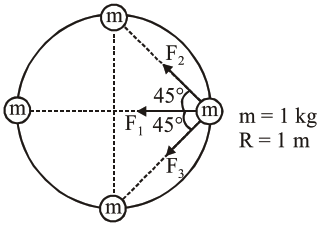Four identical particles of equal masses $1 \mathrm{~kg}$ made to move along the circumference of a circle of radius $1 \mathrm{~m}$ under the action of their own mutual gravitational attraction. The speed of each particle will be :
Correct Option: , 4

$\mathrm{F}_{1}=\frac{\mathrm{Gmm}}{(2 \mathrm{R})^{2}}=\frac{\mathrm{Gm}^{2}}{4 \mathrm{R}^{2}}$
$\mathrm{~F}_{2}=\frac{\mathrm{Gmm}}{(\sqrt{2} \mathrm{R})^{2}}=\frac{\mathrm{Gm}^{2}}{2 \mathrm{R}^{2}}$
$\mathrm{~F}_{3}=\frac{\mathrm{Gmm}}{(\sqrt{2} \mathrm{R})^{2}}=\frac{\mathrm{Gm}^{2}}{2 \mathrm{R}^{2}}$
$\Rightarrow \mathrm{F}_{\text {net }}=\mathrm{F}_{1}+\mathrm{F}_{2} \cos 45^{\circ}+\mathrm{F}_{3} \cos 45^{\circ}$
$=\frac{\mathrm{Gm}^{2}}{4 \mathrm{R}^{2}}+\frac{\mathrm{Gm}^{2}}{2 \mathrm{R}^{2}} \frac{1}{\sqrt{2}}+\frac{\mathrm{Gm}^{2}}{2 \mathrm{R}^{2}} \frac{1}{\sqrt{2}}$
$=\frac{\mathrm{Gm}^{2}}{\mathrm{R}^{2}}\left(\frac{1}{4}+\frac{1}{2 \sqrt{2}}+\frac{1}{2 \sqrt{2}}\right)$
$=\frac{\mathrm{Gm}^{2}}{\mathrm{R}^{2}}\left(\frac{1}{4}+\frac{1}{\sqrt{2}}\right)=\frac{\mathrm{Gm}^{2}}{4 \mathrm{R}^{2}}(1+2 \sqrt{2})$
$\mathrm{F}_{\mathrm{net}}=\frac{\mathrm{Gm}^{2}}{4 \mathrm{R}^{2}}(1+2 \sqrt{2})=\frac{\mathrm{mv}^{2}}{\mathrm{R}}$
$\Rightarrow \mathrm{v}=\frac{\sqrt{\mathrm{G}(1+2 \sqrt{2})}}{2}$
Click here to get exam-ready with eSaral
For making your preparation journey smoother of JEE, NEET and Class 8 to 10, grab our app now.
